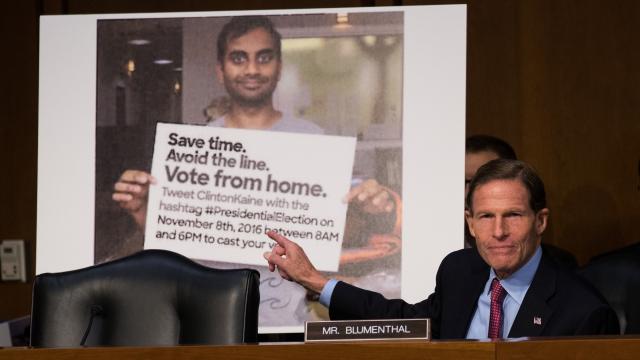It’s 2018. full 360-degree coverage in augmented reality because graphs sure are more compelling when they’re in 3D.
The thing is, this isn’t the election technology I was hoping for in the 18 years since confusing, janky paper ballots in Florida effectively gave George W. Bush the presidency. I had hoped that, by now, we’d be able to vote online. Not because I’m lazy, but because online voting would help solve crucial problems like America’s dismal voter turnout, eliminate weather as a consideration, and make it so no one has to choose between getting to their jobs or participating in democracy.
My entire life is online. Actually, my entire life can be condensed to the 4.7-inch screen of my iPhone 7. Heck, everything Alexa and ABC’s augmented reality graphics can offer, I can just google while waiting in line to vote. I can write an entire post about a candidate, what they stand for, and snap a ballot selfie to plaster over my social media feeds all from my phone. I just… can’t vote from my phone unless I’m serving overseas in the military—and even then the details of the process are dependent by state. (Although, if you’re smart, you’ll vote absentee.)
Speaking of state discrepancies, you can’t even register online in every state. So far, only 37 states and the District of Columbia let you register online. Of the states that do offer online registration, 10 implemented online registration in just the last two years. And while in-person voting isn’t hard, bad experiences caused by outdated tech can call entire elections into question. Glitchy voting machines riddled with outdated software are already casting a cloud over the legitimacy of this year’s Texas and Georgia races. It’s idiotic that we can broadcast election coverage in AR but can’t figure out how to build voting machines that work.
And it’s not just paperless voting machines. Error-prone ballot scanners can also throw a wrench into the whole voting experience. While casting my vote, the ballot scanner rejected my perfectly filled out bubbles four times before accepting it. Fellow Gizmodo reporter Jennings Brown had a worse time. At a packed polling station, Brown said, voters kept fidgeting with their ballots, thus bending them, which led to paper jams and massive delays. “My ballot wasn’t the only one that jammed the machine—I saw several other voters also getting jammed. Two poll workers basically dismantled the machine in front of me and ripped out my ballot. I had to get back in three lines to fill out a new ballot and submit it more gingerly,” says Brown. Yeesh.
So why can’t I just skip the lines and vote from my phone? There is a slew of valid reasons. Russian hackers, voter fraud, insecure connections on voting machines, and the annoying fact that all 50 states do things differently just ‘cause this is America. In particular, voter verification is a unique challenge in the U.S. considering our lack of reliable authentication infrastructure. But at the same time, it’s sad the same paper ballots that caused so much confusion in 2000 are still the best answer we have today when other technology has come so far.
It’s especially irksome when Australia, Canada, Estonia, Finland, France, Norway, and a few other countries have at least explored the idea of internet voting. In Estonia, where citizens have a digital national ID card, more than 30 per cent of voters cast their ballots online, according to the BBC. Crucially, those digital ID cards are key to authenticating voters—and if it takes a smart government ID card for me to vote from the comfort of my bed and pajamas, I’ll do it.
Security and maintaining anonymity are other obstacles facing online voting—and I’m not discounting the technological challenges of ensuring accurate yet secure ballot counts. But these days, I can pay for my GrubHub order with my face or fingerprint. I can mobile deposit a check on my phone to my bank with nothing more than a poorly lit photo. The political gutters that are my Facebook and Twitter feeds tell me exactly how my friends, family, co-workers, and my ex’s one racist uncle voted. It doesn’t seem like science fiction to think the brainiacs in Silicon Valley can figure out a way to authenticate my ballot using the Apple Watch to measure my unique heartbeat or something.
None of these emerging technologies helped me in 2018. I still had to roll out of bed and miserably wait in line like everybody else. It’s definitely not going to happen by 2020 or even 2024. But maybe by 2028? By then I will be 40, supposedly have my shit together, and hopefully, election technology will too.
